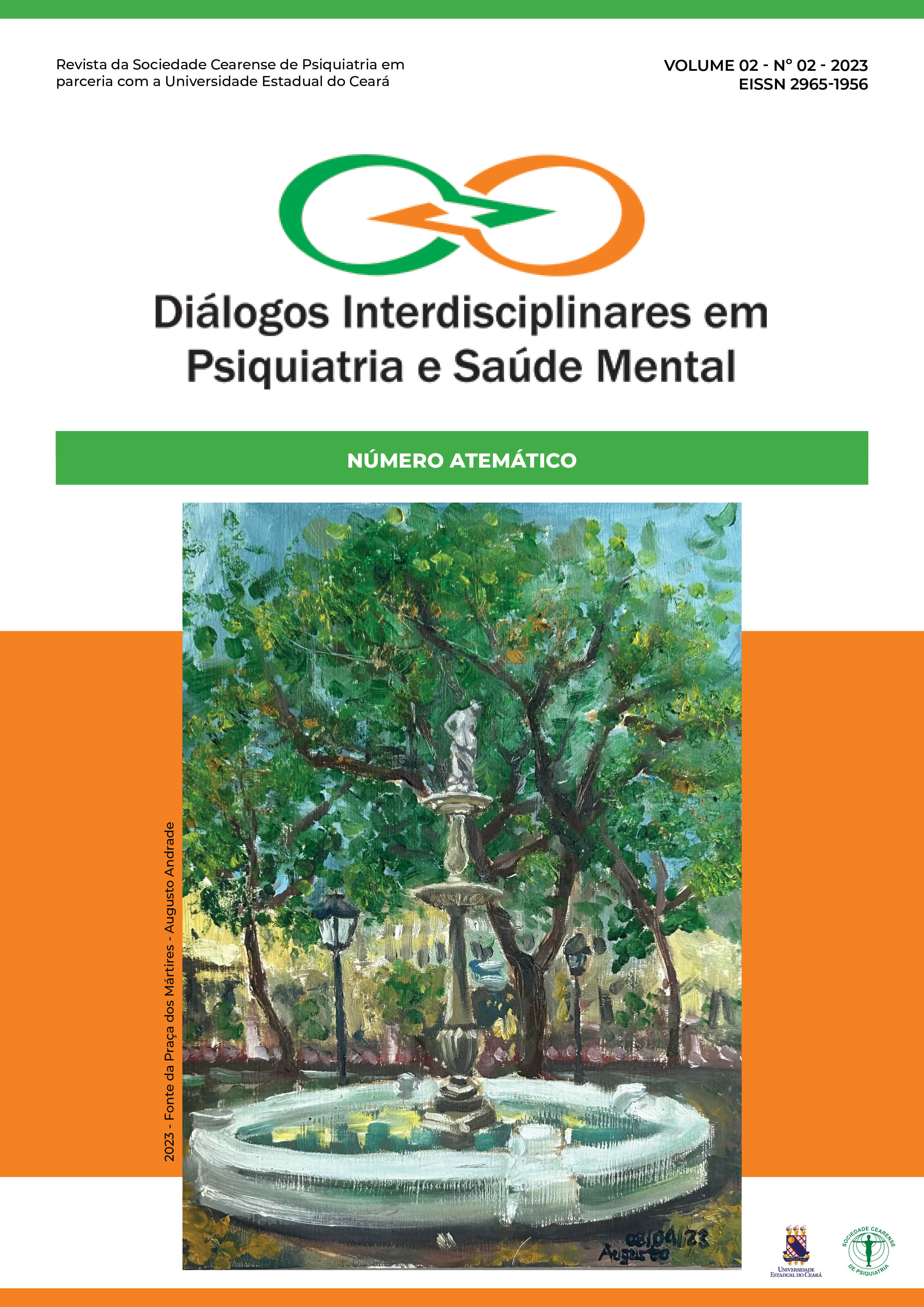Virtual Environment
evidence of complicated grief in survivors affected by COVID-19
DOI:
https://doi.org/10.59487/2965-1956-2-11072Keywords:
COVID-19, complicated grief, social networkingAbstract
Faced with the public health emergency caused by Covid-19, which created health and humanitarian crises, an inferred consequence is the increased incidence of mourning for parental loss, which may fail to follow the course considered “normal” and become “persistent”. in the face of the unusual pandemic scenario. The objective of this study was to identify, in a group of Brazilian Internet users, evidence of the state of complicated mourning attributed to death due to the consequences of the coronavirus. Based on the Diagnostic and Statistical Manual of Mental Disorders of the American Psychiatric Association, a structured questionnaire containing six objective questions was designed and applied in a virtual environment created specifically for discussions about the death process and dying from Covid-19. 234 people who recognized themselves as bereaved participated in the Survey, of which 50.4% had been mourning for more than a year; 64.1% understand that grief does not ease over time; 73.% do not consider the resumption of quality of life; 21.4% feel that society understands their concerns; 60.7% do not have access to some type of therapy; and 85.7% recognize the internet as the most effective support network for being with their peers. It is concluded that, in the researched group, a substantial portion drew the profile of Complicated Mourning and the other fraction continues tracing the same lines of evidence, which suggests the need for comprehensive care, in view of the effectiveness of mental health promotion and the implementation of disease prevention.
Downloads
References
GIOVANELLA, L. et al. A contribuição da Atenção Primária à Saúde na rede SUS de enfrentamento à Covid-19. Saúde em Debate, v. 45, n. 130, p. 748-762, 2021. Disponível em: https://doi.org/10.1590/0103-11042020E410. Acesso em: 5 jan. 2022.
KOVÁCS, M. Educadores e a morte. Psicologia Escolar e Educacional, v. 16, n. 1, p. 71-81, 2012. Disponível em: https://www.scielo.br/j/pee/a/gvYZXXFXmV89Jq66KmvcWJf/abstract/?lang=pt. Acesso em: 9 jan. 2022.
PEREIRA, C. et al. O processo de luto inerente à morte da infância à velhice. Revista de Psicologia da Criança e do Adolescente, Lisboa, v. 5, n. 2, p. 31–42, 2015. Disponível em: http://revistas.lis.ulusiada.pt/index.php/rpca/article/view/1869. Acesso em: 4 jan. 2022.
SCANLON, J.; McMAHON, T. Dealing with mass death in disasters and pandemics. Disaster Prevention and Management, v. 20, n. 2, p. 172-185, 2011. Disponível em: https://dx.doi.org/10.1108/09653561111126102. Acesso em: 10 de jan. 2022.
TAYLOR, S. The psychology of pandemics: preparing for the next global outbreak of infectious disease. Newcastle upon Tyne: Cambridge Scholars Publishing. 2019. Disponível em:https://cambridgescholars.com/the-psychology-of-pandemics. Acesso em: 07 jan. 2022.
SHOJAEI, S.; MASOUMI, R. The importance of mental health training for psychologists in COVID-19 outbreak. Middle East Journal of Rehabilitation and Health Studies, v. 7, n. 2, e102846, 2020. Disponível em: https://dx.doi.org/10.5812/mejrh.102846. Acesso em: 05 de jan. 2022.
LOPES, F. et al. A dor que não pode calar: reflexões sobre o luto em tempos de Covid-19. Psicologia USP, v. 32, p. 1-13, 2021. Disponível em: https://www.scielo.br/j/pusp/a/vwSkrFpx4syBrf3pckBc6WK/?lang=pt&format=pdf. Acesso em: 04 jan. 2022.
PARKES, C. Luto: estudos sobre a perda na vida adulta (3a ed.). São Paulo, SP: Summus, 1998.
APA. American Psychiatric Association. Manual diagnóstico e estatístico de transtornos mentais: DSM-5 (5a ed). Porto Alegre, RS: Artmed, 2014.
WORDEN, J. Grief counseling and grief therapy: a handbook for the mental health practitioner New York: Springer, 2018.
RIOS, A. et al. Atenção Primária à Saúde Frente à COVID-19 em um Centro de Saúde. Enferm. Foco, v. 11, n. 1, p. 246-251, 2020. Disponível em: http://biblioteca.cofen.gov.br/wp-content/uploads/2020/09/atencao-primaria-saude-covid-19-relato-experiencia.pdf. Acesso em: 15 jan. 2022.
WEIR, K. Grief and COVID-19: mourning our bygone lives. American Psychological Association. 2020. Disponível em: https://www.apa.org/news/apa/2020/04/grief-covid-19. Acesso em: 11 jan. 2022.
MEYER, E. Death in the age of eternity: how Facebook users cope with personal loss (Unpublished master’s thesis). Iwoa State University. 2016. Disponível em: https://lib.dr.iastate.edu/cgi/viewcontent.cgi?article=6779&context=etd. Acesso em: 04 de jan. 2022.
BAJWAH, S. et al. Managing the supportive care needs of those affected by COVID-19. European Respiratory Journal, v. 55, n. 4, p. 2000815, 2020. Disponível em: https://erj.ersjournals.com/content/55/4/2000815. Acesso em: 4 jan. 2022.
FOWLER, F. Pesquisa de levantamento. Tradução: Rafael Padilla Ferreira. Porto Alegre: Penso, 2011.
OLIVEIRA, T. Amostragem não Probabilística: Adequação de Situações para uso e Limitações de amostras por Conveniência, Julgamento e Quotas. Administração On Line, v. 2, n. 3, 2001. Disponível em: https://pesquisa-eaesp.fgv.br/sites/gvpesquisa.fgv.br/files/arquivos/veludo_-_amostragem_nao_probabilistica_adequacao_de_situacoes_para_uso_e_limitacoes_de_amostras_por_conveniencia.pdf. Acesso em: 14 jan. 2022.
ESTRELA, C. O Que é a Rede Mundial de Computadores. Disponível em: https://www.hostinger.com.br/tutoriais/rede-mundial-de-computadores. Acesso em: 31 jan. 2022.
MLABS. Quais são as principais redes sociais no Brasil? Disponível em: https://www.mlabs.com.br/blog/diferencas-entre-as-principais-redes-sociais/. Acesso em: 12 jan. 2022.
WE ARE SOCIAL. Estudo anual sobre redes sociais/2021. Disponível em: https://wearesocial.com/uk/. Acesso em: 10 jan. 2022.
BRASIL. Ministério da Saúde. Conselho Nacional de Saúde. Resolução no 510, de 7 de abril de 2016. Trata sobre as diretrizes e normas regulamentadoras de pesquisa em ciências humanas e sociais. Diário Oficial da União, Brasília, DF, 24 maio 2016.
ROCHA, T. Pesquisa em redes sociais na Internet: Os discursos no ciberespaço. Educ. foco, v. 23, n. 1, p. 225-244, 2018. Disponível em: file:///C:/Documents%20and%20Settings/Usuario/Desktop/19982-Texto%20do%20artigo-81098-4-10-20190730.pdf. Acesso em: 15 de jan. 2022.
DELALIBERA, M. et al. Adaptação e validação brasileira do instrumento de avaliação do luto prolongado - PG- 13. Psicologia: Teoria e Prática, v. 19, n. 1, p. 94-106, 2017. Disponível em: https://www.redalyc.org/pdf/1938/193851916006.pdf . Acesso em: 10 de jan. 2022.
MURPHY, S. et al. “Bereaved parents’ outcomes 4 to 60 months after their children’s deaths by accident, suicide, or homicide: a comparative study demonstrating differences.” Death studies, v. 27, n. 1, p. 39-61, 2003. Disponível em: https://pubmed.ncbi.nlm.nih.gov/12508827/. Acesso em: 16 fev. 2023.
WALLACE, C. et al. Grief during the COVID-19 pandemic: considerations for palliative care providers. Journal of Pain and Symptom Management, v. 60, n. 1, p. 70-76, 2020. Disponível em: https://dx.doi.org/10.1016/j.jpainsymman.2020.04.012. Acesso em: 10 de jan. 2022.
GILL, T; FEINSTEIN, A. Uma avaliação crítica da qualidade das medidas de qualidade de vida.Jama, v. 272, n. 8, pág. 619-626, 1994. Disponível em: https://jamanetwork.com/journals/jama/article-abstract/378367. Acesso em: 16 fev. 2023.
GIAMATTEY, M. et al. Rituais fúnebres na pandemia de COVID-19 e luto: possíveis reverberações. Esc Anna Nery, v. 26, e20210208, 2022. Disponível em:https://www.scielo.br/j/ean/a/zGDv9BZ6Lc44fxJFBBz8ktC/?lang=pt&format=pdf. Acesso em: 15 jan. 2022.
SOUSA, R. Vulnerabilidade, vida precária e luto: os impactos da pandemia da Covid-19 no Brasil. UNIFESSPA contra a Covid-19. 2020. Disponível em: https://acoescovid19.unifesspa.edu.br/images/Vulnerabilidade_vida_prec%C3%A1ria_e_luto_os_impactos_da_pandemia_da_Covid-19_no_Brasil_-_25_de_maio.pdf . Acesso em: 01 jan. 2022.
GUINA, J. et al. Benzodiazepines for PTSD: a systematic review and meta-analysis. J Psychiatr Pract., n. 21, p. 281-303. 2015.
RIBEIRO, A.; FITARONI, J A expressão do luto no Facebook: uma análise de publicações na rede social. TCC-Psicologia, 2018. Disponível em: https://www.repositoriodigital.univag.com.br/index.php/Psico/article/view/98. Acesso em: 16 fev. 2023.
BOUSSO, R S. et al. Facebook: um novo locus para a manifestação de uma perda significativa. Psicologia Usp, v. 25, p. 172-179, 2014. Disponível em: https://www.scielo.br/j/pusp/a/xPYxKvNwrN76gNMVrsmj5Hd/?format=html&lang=pt. Acesso em: 16 fev. 2023.
Downloads
Published
How to Cite
Issue
Section
License
Copyright (c) 2023 Márden Cardoso Miranda Hott

This work is licensed under a Creative Commons Attribution 4.0 International License.














